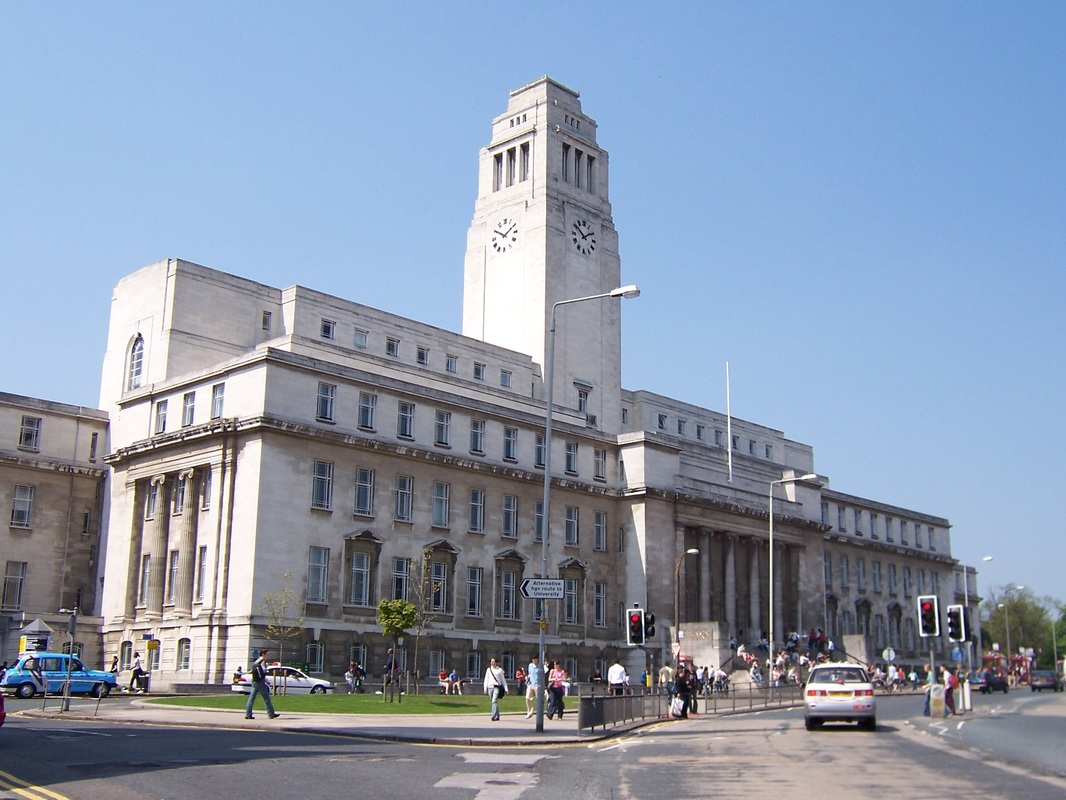I studied my BA in Spanish at the University of Leeds, so there was no real settling in period for me. I think that the University of Leeds is a pretty good university, although I haven’t really had time to explore any others in the UK. It has a large centralised campus relatively close to the city centre, with good library and IT facilities. There is an excellent sports complex on campus and one of the biggest student unions in the UK. There is always something going on if you want it, however obscure your hobbies might be.
As for the city of Leeds, I would say that it is a typical Northern city. The city is pretty big but the centre is quite small and honestly not the most exciting or aesthetically pleasing in the world. On top of that it rains a lot. But if you know the good places to go, and find some decent people to spend time with, it can be as nice a place as anywhere. And it is only a short drive or train ride away from the Yorkshire Dales and numerous other picturesque countryside spots.
The course (as of 2012-13, there may have been some minor changes)
As with your undergraduate degrees, the course is divided into modules. You have to complete 180 credits, and the weighting of the modules vary from 15 to 45 credits. You have to take the following compulsory modules:
· 45 credits: Computer Assisted Translation (CAT). This is where you learn to use CAT tools, which are the computer programs which help you translate (not to be confused with Machine Translation, which tries to translate for you). It is a really good module, and very practical, although you do have to do some academic essays. The best bits of the module is the team projects, which try to simulate real translation situations, including designing your quotes and invoices! These are the activities you will remember when you finish.
· 30 credits: Methods and Approaches. This is the academic side of the course which justifies its status as a Masters. The content is interesting but I would argue most of it is common sense. You have to write a commentary justifying your translation decisions for a particular text (an interesting and worthwhile activity, I’d say) and then an essay on the topic of your choice. Arty people will probably enjoy this module whilst the more practically-orientated might hate it. But it must be slogged through if you are going to gain your MA. (If you just want a Post Graduate Diploma, you don't have to do Methods and Approaches!)
· 30 credits (or more, if you have two languages): Specialised Translation. This is where you will practice translating texts in your specialised languages. There are individual groups for different languages. There are four main themes, General/Admin, Journalistic, Literary and Technical, all with different tutors – you might want to be thinking about which themes and subject areas you find most interesting as you will probably want to specialise when you begin translating. The classes I had were simple enough: translate a text for homework and then discuss it in class. I found this format good, although some teachers had more practical experience than others. Each text type is tested, half in a “take home exam” and the other as an “open book” timed exam, but with online dictionaries allowed.
· 45 credits: Extended Translations/Dissertation. This is the “summer project” which you carry out at the end of the undergraduate year in June, to complete around August time. Here, you have to translate two 5,000 word texts and write a commentary for each of them, or a dissertation of 10-12,000 words. Most or all of students do the translation instead of the dissertation and it appears to be both the easier and more practical option. In fact, I found the extended translation one of the easiest parts of the course, given that it assesses the real practical skill that you are going to be using on completion of the Masters.
If you have any credits left, you have to take elective modules. These are free modules to be taken either in Translation Studies or anywhere else in the University. Choose them wisely, as they are worth as much as the compulsory modules. I would recommend doing something totally different to translation (for example I pursued a specific interest in the School of Education). You might also consider learning a new language, which is interesting and potentially easier than a Master’s level module.
The teaching
Teaching at the Centre of Translation Studies is generally pretty good, especially in the Computer Assisted Translation module. Of course, you are at an academic university, so some teaching staff may appear to be in a world of their own (research). But overall I found the staff approachable, helpful and knowledgeable.
The space
Translation Studies students are given their own computer space, called ERIC. Although this is sometimes used for classes, most students spend time in there and I found it both a good working environment and a positive place to establish friendships. There is also a Linguistic Lab which can be used, although I often found that this was busy.
Fellow students
One of the best parts of the course for me were my colleagues. I would advise you to introduce yourself and build relationships early – it is a one year course and the module system and computery nature of the course can isolate you at times. I found the fellow students to be mature, intelligent, and excellent company. I have made some lifelong friends on the course which are arguably more important than the degree certificate at the end of the course.
General tips
· Don’t worry about the academic standard. If you have studied a language degree at a UK university or similar before, I do not anticipate you will find the course too difficult. It does appear to be harder to get a “Distinction” (equivalent of a “First”), but overall passing the course was not too stressful.
· Don’t expect a lot of contact time. This is UK university life and you will be left alone to do activities, carry out team projects, attend guest lectures, read, socialise.
· Try and meet people early. Translation can be a lonely business, but the people on the course are great. Get to know them.
· Embrace the team projects. These are the best part of the course in my opinion. Treat them as if they were real life projects and you will find them useful, especially if you haven’t had practical translation experience.
· Don’t take your tutors’ comments too seriously. The specialised translation tutors are only human translators. Their comments are valuable but not sacred.
· Don’t worry about theory. Complete Methods and Approaches but use your common sense would be my suggestion.
· Choose your elective modules wisely. The last thing you want is to be bogged down by an elective you didn’t want. I would recommend taking elective modules in different parts of the university. If you’re anything like me you like a bit of variation. Take a language or a course in Traditional Alcoholic Beverages at the World Class Centre of Food Sciences if you are so inclined.
· Start thinking reasonably early about what you might like to specialise in. You want to be translating something that you enjoy and find motivating, as well as becoming more employable. You don’t have to have it set in stone, but it might be worth thinking about what you are going to enjoy waking up every day and working on.
· Apply to agencies and start networking as soon as you start the course. If you have spare time, use it. Send your CV off to agencies and start getting work if necessary. Establishing yourself as a translator takes time – might as well start while you’re studying.
Should I take the course?
If you are genuinely interested in becoming a translator and have the time and money to take the course, I would recommend this MA wholeheartedly. Even if you’re not sure but think translation might be an avenue you might want to explore, it is worth doing. It is only a year long and will be practically useful even if you decide not to translate full time after graduation.
Nicky Bremner


 RSS Feed
RSS Feed
